The Supreme Court of India recently addressed a case involving the Indian Medical Association (IMA) and Patanjali Ayurved over misleading advertisements. The two-judge bench, consisting of Justice Hima Kohli and Justice Sandeep Mehta, criticized the IMA for issuing a limited apology in newspapers. This article explores the details of the case, the Supreme Court’s ruling, and its implications for advertising standards and accountability.
Patanjali Ayurved, a well-known Indian consumer goods company specializing in Ayurvedic products, faced accusations from the IMA regarding misleading advertisements. The ads allegedly made false claims about the effectiveness of Patanjali’s products, raising concerns about consumer deception.
The IMA, representing doctors of modern scientific medicine, took legal action against Patanjali. The case garnered significant attention due to the high profiles of both organizations and the impact of advertising on public health and consumer trust.
Supreme Court’s Ruling
The Supreme Court’s judgment centered on the adequacy of the IMA’s apology to Patanjali. The court found the apology to be insufficient and emphasized the need for a sincere and comprehensive apology in cases involving public misinformation and consumer deception.
Key Points of the Judgment
- Inadequate Apology: The court noted that the IMA’s apology did not fully address the seriousness of the misleading advertisements. Justice Kohli questioned the scope of the apology, emphasizing that it should be issued to all publications that carried the misleading information.
- Personal Accountability: The court insisted that the apology should be issued personally by Ashokan, a member involved in the case, and not funded by the IMA. The bench emphasized that the apology needs to come from Ashokan’s own pocket to ensure personal accountability.
- Contempt Charges: The Supreme Court noted the request by the IMA’s counsel to defer contempt orders against Ashokan, allowing time for him to take appropriate steps to address the contempt charge.
Broader Implications
The Supreme Court’s ruling has several broader implications for advertising standards and accountability in India:
1. Enhanced Scrutiny: The judgment calls for enhanced scrutiny of advertisements, particularly those related to health and wellness products. Regulatory bodies may need to implement stricter guidelines to ensure that all claims are scientifically valid and not misleading.
2. Consumer Trust: The ruling aims to restore consumer trust by ensuring that organizations are held accountable for their advertising practices. Sincere apologies and corrective measures are essential in maintaining public confidence.
3. Legal Precedent: The case sets a legal precedent for how apologies and accountability should be handled in cases of misleading advertisements. It reinforces the idea that superficial apologies are insufficient in addressing public misinformation.
Importance of Accurate Advertising
Accurate advertising is crucial, especially for health-related products. Misleading advertisements can have serious consequences for consumers, leading them to make uninformed decisions about their health. Ensuring that advertisements are truthful and based on scientific evidence is essential for protecting consumer health and maintaining trust in the market.
The Role of Regulatory Bodies
Regulatory bodies play a critical role in overseeing advertising practices and ensuring that companies adhere to established standards. This case highlights the need for these bodies to be vigilant and proactive in addressing misleading advertisements. Implementing stringent guidelines and conducting regular audits can help prevent the dissemination of false information.
Consumer Awareness
Consumers also have a role to play in combating misleading advertisements. Staying informed and critically evaluating product claims can help consumers make better decisions. Educational campaigns and public awareness initiatives can empower consumers to recognize and report misleading advertisements.
The Supreme Court’s criticism of the IMA’s limited apology in the Patanjali misleading ads case highlights the need for greater accountability in advertising practices. The judgment highlights the importance of sincere apologies and comprehensive corrective measures in cases of public misinformation. By setting a legal precedent, the ruling aims to enhance consumer protection and restore public trust in advertising.
As regulatory bodies and organizations work towards stricter guidelines and enhanced scrutiny, it is crucial to prioritize accuracy and transparency in advertising. This will ensure that consumers are not deceived by false claims and can make informed decisions about the products they choose to use.

 As regulatory bodies and organizations work towards stricter guidelines and enhanced scrutiny, it is crucial to prioritize accuracy and transparency in advertising.
As regulatory bodies and organizations work towards stricter guidelines and enhanced scrutiny, it is crucial to prioritize accuracy and transparency in advertising.










.jpeg)







.jpeg)

.jpg)










